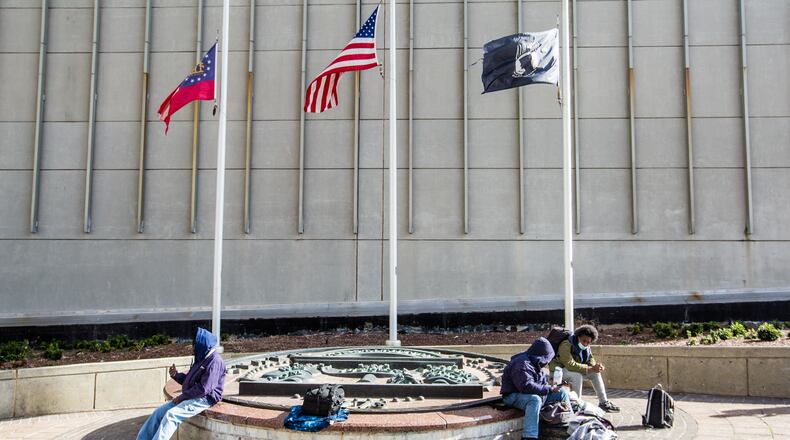A few months ago, armed with cash from the first coronavirus relief package, the city of Atlanta set out with an ambitious goal: Moving 800 people off the streets and into their own apartments.
The scope of the project was unlike any past efforts to curb homelessness in Atlanta. Case workers visited homeless encampments and moved hundreds of people into a hotel downtown, while making calls to landlords and applying for open apartments across metro Atlanta.
And the program is seeing results. Partners for Home, the nonprofit that heads up the city’s homelessness strategy, said roughly 450 formerly homeless individuals have already moved into apartments, many with one-year leases.
Another 190 are still going through the process and are set to move in within the next few weeks.
“Once I got that apartment ... it felt like a load had been lifted from off my shoulders,” said Efrem Belvin, who was recently given housing through the new program. “This is a really really big step for me.”
Belvin moved to Atlanta about 15 years ago and has been homeless on and off for the last few years. He was doing OK before the pandemic hit, selling beer at sports games and other big events — “having the time of my life,” he said — but that all dried up a year ago. Since then, he’s spent a lot of nights under bridge overpasses, worried about finding food, shelter and clothes.
That changed in November when an outreach worker approached him under an I-20 overpass and told him about the program. He moved into the hotel and applied for an apartment two weeks later. He now lives in a one-bedroom unit in Stone Mountain.
“All the way through the end, I was saying, this cannot be happening to me,” said Belvin, 52. “Even down to the point when I signed that lease.”
The housing effort was launched in the fall using about $18 million from federal coronavirus relief allocated to the city. Partners for Home added an additional $6.5 million from private philanthropic contributions.
It aims to help people who are chronically homeless, on the verge of being chronically homeless or people facing homelessness who are between 18 and 24 years old.
The goal is to transition the chronically homeless into a permanent housing program over the next year or two. The younger people who are housed may develop a cost-sharing agreement over time and contribute to the rent as they get back on their feet.
Cathryn Marchman, the executive director of Partners for Home, said she has been pleasantly surprised by the number of apartments that have been secured. She said the city has been able to pay fees to landlords to hold some apartments before move-ins happen, which has been a big help.
Once I got that apartment ... it felt like a load had been lifted from off my shoulders.
Eventually, though, COVID relief funding will run out. Marchman and other leaders in homelessness prevention efforts said they hope state and local governments will continue to put dollars toward these rehousing efforts.
“The work that we’re doing right now is a huge undertaking,” Marchman said. “We’re creating a roadmap for how we can achieve large-scale housing placements and I think now the question is, ‘How do we sustain it?’”
As part of the program, outreach workers are going to homeless encampments around the city and offering housing to those who live there in order to close the camps down. Marchman said about 250 people from eight encampments were moved into the hotel and are in the pipeline for the housing program.
Of course, there have been hiccups along the way, the city still must find 200 more apartments to reach its goal. Some rental applications have been denied, and a few people have been hesitant to take part.
Credit: Jenni Girtman
Credit: Jenni Girtman
But Brad Schweers, the executive director of Intown Collaborative Ministries, said that number has been minimal. He described one encampment where 34 people lived. His team visited and offered to move them into the hotel, and all but one accepted. The encampment was cleared out in November.
His organization has helped find apartments for 160 people since Dec. 1. Previously, the most people it has ever housed in a year was 120.
“We’ve never had such amazing housing resources available,” Schweers said.
For Belvin, living on his own is “totally scary,” he said, but he has a case worker who checks in with him to discuss how things are going. He plans to get back to work soon and is confident the newfound stability will help him get back on his feet.
“For a while, I can say that I started to lose hope, and I started to see that this is what it was going to be,” he said, describing his experience being unsheltered. “I don’t want to go back to that.”
Landlords in metro Atlanta who are interested in participating in the program can email listings@opendoorsatl.org or call 470-222-3213 for more information.
About the Author
The Latest
Featured




